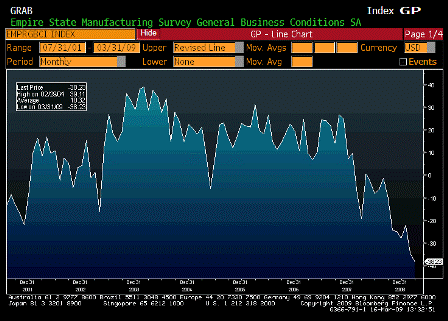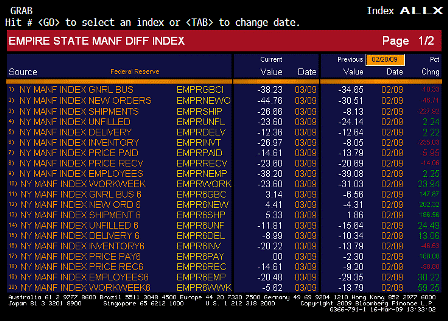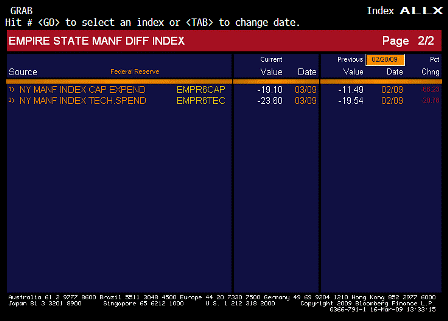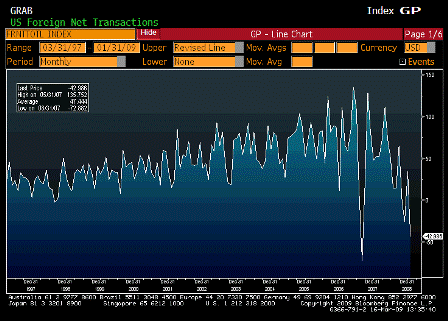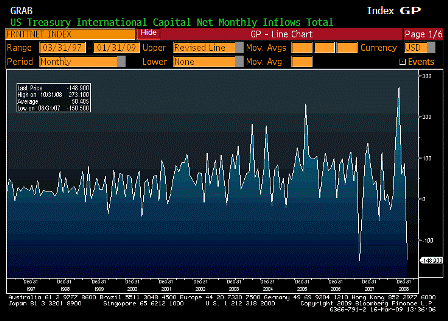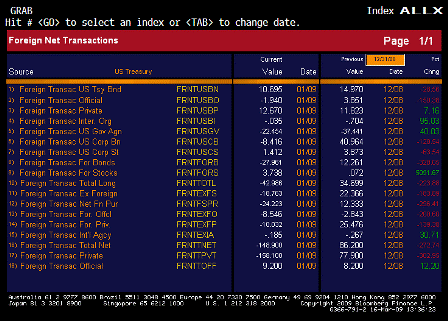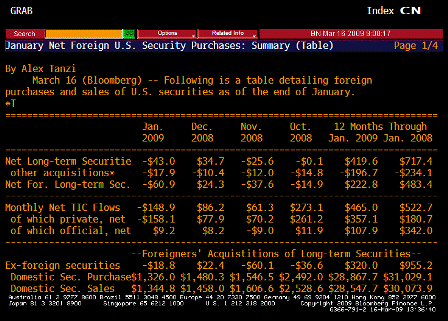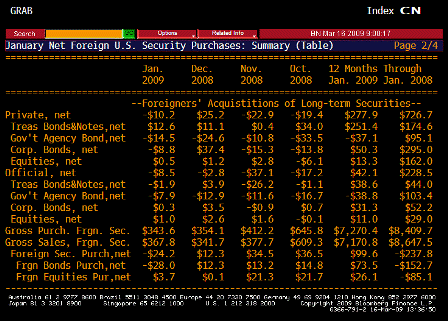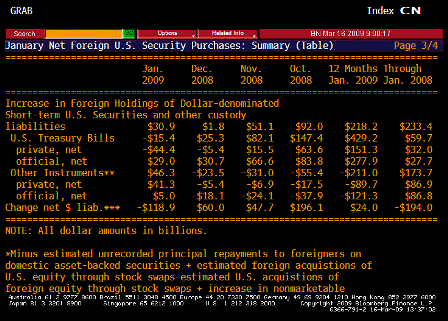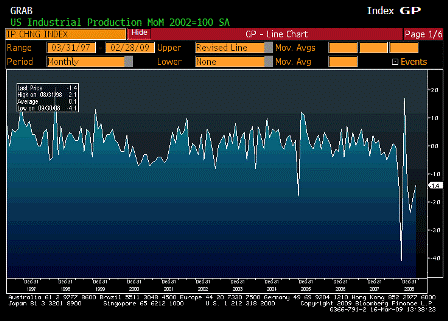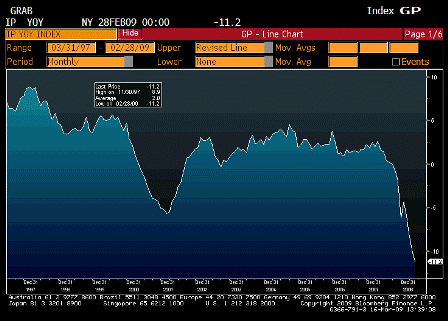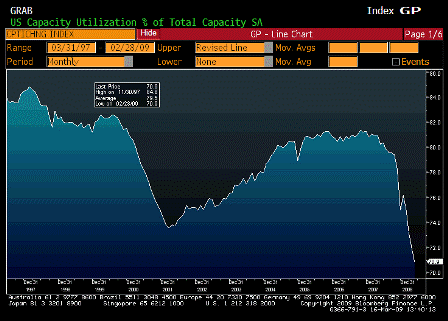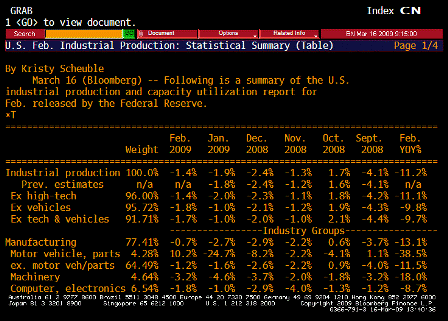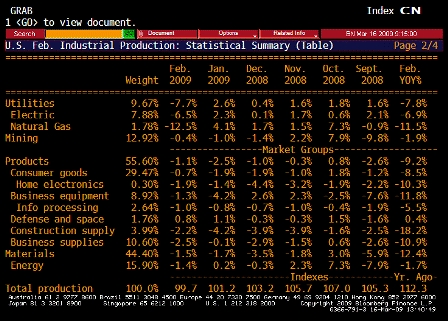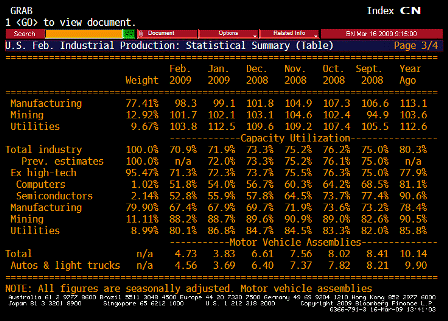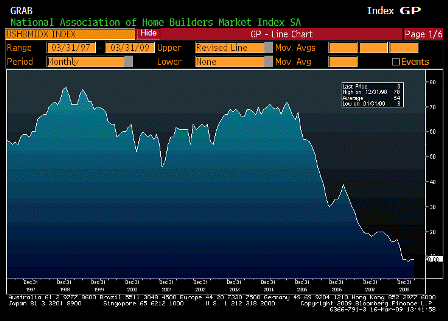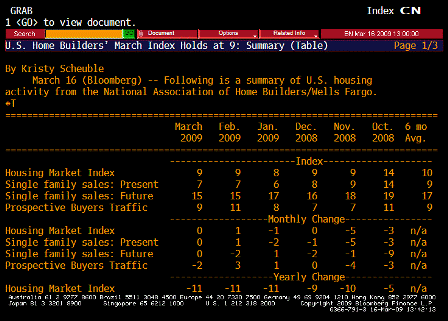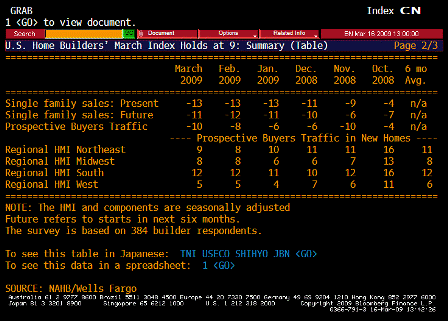[Skip to the end]
Some interesting facts, but yet another professor of economics who doesn’t understand the monetary system.
Notes on the Economy
Professor Bill Dunkelberg, Ph.D.
Mar 10, 2009
There is good news and bad news from the housing market this week. Housing starts fell to a level of 460,000 units last month, the lowest in decades. This looks bad given that in normal times we need about 1.5 million new starts to meet the demand from new households that are formed each year and deletions from the stock from storms, fire and demolition. We are only building a third of what we need.
Yes! The pent up demand has to be enormous. And with inventories as low as they are this could mean a rapid recovery in prices in many areas.
This is good news because since 2000 we constructed over a million houses more than we needed. These surplus homes are weighing on house prices, driving them down. Under-producing will help get rid of the excess supply. Sales of existing homes have reached a rate of nearly 5 million, almost as many as were sold when the economy peaked in December of 2007. The oversupply problem in some areas such as Florida and California will take longer to resolve but the rest of the country will start to stabilize and construction will resume in the first half of this year.
There are a number of factors that are setting the stage for a resumption of economic growth later this year. First, if oil stays under $50 a barrel, we will enjoy the equivalent of a $400 billion dollar stimulus tax cut. It’s already in place.
Yes, though somewhat offset by a drop in spending by energy producers whose incomes have been cut drastically.
As the recession lingers, pools of pent-up demand are building. Car sales have declined to a rate of 9 million cars, while we scrap 15 million from the stock of 250 million cars on the road. Buying will resume soon.
Agreed.
Plant and equipment expenditures have been postponed for some time and will soon have to be made. Inventories have been drastically depleted and will have to be replaced.
Agreed.
It is the reduced spending of the 140 million workers who still have a job that has slowed the economy to recession levels. The media news and our leadership have scared consumers and business owners. Their lack of confidence has resulted in the postponement of spending. This will begin to reverse itself this year and the private sector, not the government, will restart the economy and lead us out of recession as it always has in the past.
Do not agree. Personal income and spending turned positive in January, with a large assist from government pay increases, including social security and other CPI Indexed payments. And in the past it has been government via the ‘automatic stabilizers’ that has turned the tide as well. Falling tax revenues and rising transfer payments due to the slowdowns added the financial assets that supported the subsequent expansions.
Government spending accounts for 20 percent of GDP and the federal budget alone is equal in size to 25 percent of our output. So, what government does has a large impact on the private sector economy.
Agreed! And today, as in the past, it is leading us out of this recession. And it was the proactive Bush fiscal adjustments in 2003 that led us out of that slowdown and assisted the automatic stabilizers, rather than allowing them to play it out in the ‘ugly way’ as we have done currently.
Currently, the absence of a clear direction and plan from Washington is hurting the financial markets and private spending. The confusion surrounding policies for dealing with our banking problems has driven stock prices for banks to unbelievable lows. The sketchy program for assisting some homeowners with taxpayer money has generated both confusion and outrage. The so-called stimulus package doesn’t have much immediate stimulus in it such as tax cuts and since nobody read it, we don’t know what spending will be done and when.
For the most part yes. That’s what can happen with a government who doesn’t know how the monetary system works.
And of course we all worry about how the government will get the $800 billion that it proposes to spend. Remember, the only money the government has to spend is your money. So, tax hikes, supposedly only on rich people, and heavy borrowing are in our future.
And when the academics also don’t understand how the monetary system works.
They don’t seem to know that government spending is not operationally revenue constrained.
They don’t seem to know that taxes function to reduce aggregate demand, and not to provide ‘revenue to spend’.
They don’t seem to know that government ‘borrowing’ functions as interest rate support, and not to provide ‘revenue to spend’.
They don’t seem to know that the only source of savings of financial assets for the non government sectors is government deficit spending.
Everybody is waiting to see what the government is really going to do, waiting to be saved. Our experience in New Orleans suggests this is a bad idea.
Agreed!
Soon consumers will start receiving checks from the so-called stimulus package. If you aren’t rich, you will receive a check for $400. The last time we did this was last year, with $500 checks.
And real Q2 08 GDP was up 2.8%
According to the University of Michigan survey research center, 20 percent of the recipients said they would spend the money, 30 percent planned to save the money, and 50 percent planned to pay off debt.
If the funds aren’t going to be spent and add to aggregate demand, it means we can ‘enjoy’ even larger tax cuts and/or spending increases until demand is restored to levels that supports desired output and employment.
This is offered by some to discredit the notion that sending out checks will be stimulative, since only 20 cents on the dollar gets spent and the rest goes to savings or debt repayment. That isn’t necessarily bad.
Right, as above. It’s actually a ‘good thing’.
20 years ago, we saved over 10 percent of our after tax income but our saving rate fell to 0 in the past few years. At the end of last year, we saved 5 percent, nothing to brag about but an improvement.
Interesting that it happened as the federal budget deficit went up? While the definition of savings varies, the savings of financial assets added by deficit spending are a substantial portion.
But it was this sudden increase in savings that led to a huge reduction in retail sales in the fourth quarter, so in the short run, more saving can slow the economy.
Yes, less spending slows the economy. And that immediately opens the door for a federal tax cut and/or spending increase to sustain demand.
And if we don’t do that, it happens the ugly way, via the automatic stabilizers which ultimately rescue us from our own ignorance.
But, if you don’t save and put money in the bank, no mortgage or business loans can be made.
Yikes! Loanable funds theory! This is fixed FX/gold standard. Completely inapplicable with today’s non convertible currency and floating FX policy.
The causation is from loans to deposits (and reserves).
Making these loans results in new investment spending, not just consumption.
Yes, funds are borrowed into existence.
This helps to raise worker productivity and income.
Yes, wise investment raises productivity.
We have to stop borrowing from foreign savers and rely on our own savings to finance new investment and new home mortgages if we want to rebuild our economy.
This is what happens when you are mired in loanable funds/fixed FX rhetoric.
Academics should know that domestic credit funds foreign savings, not the reverse.
But until you understand loans create deposits you remain part of the problem rather than part of the solution.
There are over 8,000 earmarks in the omnibus spending bill passed by congress. Here are some examples: sidewalk construction in Cherryland California, Totally Teen zone in Albany Georgia, school sidewalk in Franklin Texas, bus for Lawrence Kansas and Detroit Michigan and Culver City California, Lemon Street reconstruction in Florida and Vienna Virginia and Williamstown Vermont, 5th and Market Street improvements in Philadelphia, Old Tiger Stadium conservancy in Detroit, and the list goes on for 8,000 items like this.
I am not offering a commentary on the worthiness of these projects, here’s my issue: why are these 8000 projects a federal matter, why is the Congress of the United States managing this? These are very local issues as are issues related to the quality of education.
Agreed, which is why I proposed the Feds in this case simply give the states funding on a per capita basis with no strings attached. This removes the ‘fairness’ issue and moves the fiscal responsibility issue to the state level.
We send our money to Washington, put on knee pads and beg to get our money back to take care of local problems. Trust me, the overhead charge Congress imposes on your money is huge. Congress loves the power, of course, and loves having governors and business leaders groveling in front of them. This is nonsense, and hugely wasteful of our hard earned money.
I don’t like this much either.
The latest available IRS data for 2006 indicate that tax filers with $200,000 or more in income, about 7 percent of all filers, paid $520 billion in income taxes. That was 60 percent of all income tax revenue paid. So, 7 percent of the taxpayers paid 60% of the income tax revenue collected. The top one percent paid in 40 percent of all tax revenue collected.
The huge increases in spending now approved are to be funded by an increase in income taxes on so-called “rich” people. Suppose that we in fact take 100% of the incomes of those earning $500,000 or more. In 2006, a strong economic year, this would have produced about 1.3 trillion in tax revenue, less than half of government spending that year. With 4 trillion in spending expected in the 2010 budget and an economy much weaker than in 2006, it should be clear that raising taxes on the rich cannot come close to funding government spending. In 2006, taxing 100 percent of the incomes of those making $75,000 or more would have raised less than $4 trillion dollars.
When you recognize taxes serve to reduce aggregate demand, rather than provide funds for federal spending, the entire discussion is fundamentally altered, and much of the above becomes total nonsense.
Also, if you look at net, after tax income, and if you look at income tax as a way to adjust after tax incomes progressively (as well as to reduce aggregate demand) you get a very different picture.
That leaves the prospect of a trillion dollars in new borrowing
And exactly that amount of new savings for the non government sectors. That’s the ‘important’ part.
and interest on a larger debt for decades to come.
That’s voluntary as the US could leave its current 0% interest rate policy in place indefinitely, as I have recommended. But that’s another story. (see ‘0 is the natural rate of interest’ on my website)
Last year, we paid over $400 billion of tax payer money to service the debt. That’s $1,300 per person. This burden is only going to rise in the future as our indebtedness rises.
First, we can alter that, as above so the point is largely moot.
Second, interest income is taxable.
Third, last year it was a bit over 2% of GDP last year but he didn’t phrase it that way to try to be alarmist.
Not to mention the way federal debt is paid off is quite simple:
The Fed debits your securities account and credits your bank’s Fed bank account: That’s all.
Consumers are learning how to be lean and mean and save money (savings rate up to 5% of disposable income after years of 0% saved), perhaps the government should join the party.
Funny how savings goes up as the Fed deficit goes up???
Recently, a well known governor, appearing on the Sunday talk shows, defended the proposal to tax rich people more by suggesting that Clinton’s tax hike resulted in budget surpluses and strong economic growth. It doesn’t take an economist to recognize the absurdity of that statement.
The strong economy generated the surplus via those pesky automatic stabilizers, which then caused the coincident drop in saving and the subsequent collapse in GDP.
Yes, taxes were raised on the rich by a Democrat Congress. Then the democrats were thrown out. Fiscal conservatives gained control which helped control spending. The “politics” of the deficit were negative and the congressional budget office predicted huge deficits through 2000. But several events that are not likely to repeat in many lifetimes took over. Most important was “y2k”, a fear that anything with a chip would fail as the calendar clicked over to 2000. This produced a huge surge in tech spending which was accompanied by a telecom boom (fiber optics etc.) That drove employment to a record high 64.5% of the adult population.
Fueled by a domestic credit expansion of over 7% of GDP as the surplus sucked financial assets from the domestic sector.
This had nothing to do with raising taxes on the rich, but since economic growth was so strong, tax revenues came in much stronger than anticipated and several years of budget surpluses occurred.
And equal drops in savings of financial assets- the equity that supports the credit structure. Which we are still recovering from today.
Unfortunately all of this came to an end in the last half of 2000 while Clinton was still president. The budget surpluses would have occurred without the tax hike, but were probably larger because of it. A $100 billion of the surpluses was due to capital gains taxes in the best years, unfortunately not a tax on productive income generation. It was just another big redistribution of wealth, for every winner, a loser with government taking a slice along the way.
Time to get back to the basics, it’s the private sector that creates wealth, not government and taxing working people will not enhance the recovery.
The government sector can depress economic activity via fiscal drag from overly tight fiscal policy.
This happens when the government doesn’t spend enough for us to pay taxes and net save as desired.
With savings desire elevated (reduced desire to go into debt), the government needs to increase deficit spending to reduce the fiscal drag it’s imposing.
Feel free to send this along to the good professor, thanks!
[top]



